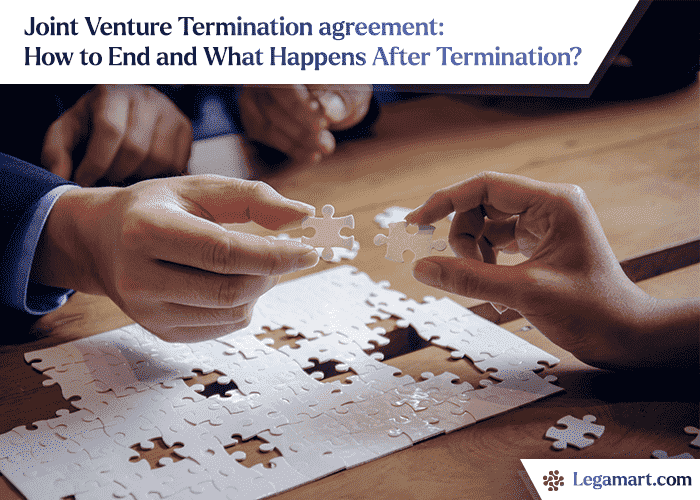- Introduction to Joint Venture Agreements
- What is the difference between Joint Venture and Partnership?
- What are the 4 types of joint ventures?
- What are the requirements of a Joint Venture Agreement?
- What are the advantages of a joint partnership?
- Why do Joint Ventures Terminate?
- What are the key Considerations when Terminating a Joint Venture?
- What are the Steps for Operationalizing a Joint Venture Termination Agreement?
- What Happens after the Termination of a Joint Venture?
- Joint venture agreement template (Joint Venture has Achieved its Purpose)
- Frequently Asked Questions
- Conclusion
Joint venture termination agreements and procedures require consideration of several legal aspects and formalities as the benefit or loss of one member of joint ventures closely relates to the benefit or loss of the other member since multiple parties join together to augment their capital, skills, and workforce.
Still, there are times when it is necessary to terminate the joint venture for some legal or other reasons.
What is the procedure for terminating a joint venture, and what do you need to consider once the joint venture ends? Let’s discuss this through this article.
Let’s begin.
Introduction to Joint Venture Agreements
JV occurs when two or more individual entrepreneurs or businesses join to achieve a specific goal. These individual entrepreneurs or enterprises need not be of the same business size or discipline.
This business partnership enables each company to profit from what its partners offer, such as capital, skilled and experienced workforce, or enhanced advertising or marketing capacity to reach a broader or formerly undiscovered market. The principal office for the JV can either be the office of one of the partner companies or be a new office in some competent jurisdiction, as preferred by the parties involved.
Considering that each company has an equal share in revenues (both profits and losses), expenses, and control of the enterprise, this means achieving a business goal, exploring new markets, gaining access to foreign markets, or taking any other important decision related to the JV, the permitted assigns are expected to provide their written consent. It is also possible for the partners to conduct a special meeting to take the final decision.
A joint venture partnership agreement includes a “preplanned exit strategy” to safeguard all parties after the partnership achieves its goal.
What is the difference between Joint Venture and Partnership?
JV are a collaboration of specific goals or projects, partnerships are a business structure that dictates how the company shall be regarded in state law and how it shall be identified for tax purposes. Therefore, while JV is temporary partnerships created between the parties hereto, partnership agreements are preferred by small businesses in line with what is often recommended by venture books.
Further, in JV, each party can file an independent tax return. However, partnerships are taxed as a pass-through tax entity. While liabilities in a joint venture lie with each individual, it is shared in partnerships. Therefore, there is no limited liability, except in cases where a limited liability partnership agreement has been started.
What are the 4 types of joint ventures?
Project JV. This joint venture is limited to completing that specific project/purpose. Here, the initial contributions for the project are made in accordance with the JV agreement and the obligations hereunder.
Functional JV. In this JV, Two companies, with their individual strengths and functions, come together to create a symbiotic environment for each other.
Vertical JV. Exists between two business entities at the same supply chain. An example might be a scenario where one entity producing a certain kind of good requires specialized raw materials from another company.
Horizontal JV. Exist between two business entities producing the same goods and services. This helps a company to enter a foreign market or business relationship through additional capital contribution by another company through a JV agreement.
What are the requirements of a Joint Venture Agreement?
One of the basic requirements to be fulfilled before entering into a joint venture agreement is to evaluate whether your chosen partner is right for JV. This is especially considering how the partner would be involved in the day-to-day operations of the business, as well as being a part of confidential agreements.
Once you have chosen the right person/company, go ahead with a JV agreement by completing the following checklist with such party:
Business address. Taking into account the company’s form and management structure, try to identify the best place for conducting the business.
JV type. Identify the right JV type and adjust the agreement accordingly for capital contributions, venture property, interested parties, etc.
Purpose of the agreement. This is in collaboration with the JV type. Understand the purpose of the agreement, decide on the right type of joint venture, and only then go ahead with the arrangement.
Names and addresses of the members. Ensure that all details about the partnership have been adequately included in the agreement terms.
Duties and obligations. The general partnership formed through this agreement should clearly distinguish roles, duties, and obligations to ensure fewer conflicts of interest at a later stage. The role related to the JV as a separate business entity, different from the normal business, might also be established in the agreement.
Voting and formal meeting procedures. There must be a clear direction about how important decisions shall be voted upon and an adequate forum for conducting such activities. If required, there can also be a demarcation between important communications and other communications.
Profit and loss allocation. Clarity must have been reached for profits and losses at the start, considering most of the disputes only arise in this section. Clear guidelines for other intangible assets, tangible assets, intellectual property, capital account, liability, etc., must be laid down in the JV agreement template.
Dissolution terms. This is where terms for terminating a joint venture agreement come into place. It is possible to include this as a separate clause or enter into a separate agreement for this.
Non-compete and confidential agreements. Provide details about confidential terms and clarity on what happens if any of the partners already have a competing business or wish to start a competing business in the future. Clarity should be achieved related to whether the parties are bound by this one company or are free to pursue two companies or more during the term of the agreement.
What are the advantages of a joint partnership?
A joint partnership can help your business to grow faster, generate greater profits, and increase productivity. Some of the other benefits include:
- Increased access to new distribution networks and fair market.
- Sharing of risks, and losses with a partner (not a limited liability company)
- Access to new expertise and knowledge of specialized staff
- Access to greater resources
- You might also be able to use your partner’s customer database for marketing your product
- Join forces in research, purchase, and development
Why do Joint Ventures Terminate?
There can be multiple reasons leading to a JV termination agreement. These are:
In case of a joint venture termination agreement between the parties
If members terminate a joint venture agreement to end the joint venture at a specific time or upon fulfilling a condition (being an intrinsic part of the agreement), then at the given time or upon completing the requirement. Then, in that case, the termination of the joint venture agreement is enforced.
When the joint venture is no more profitable or practicable
A joint venture may cease if it becomes unprofitable or impractical to avoid further loss or gross insolvency for the party hereto.
When the project under joint venture is accomplished
The joint venture has already achieved its purpose, so it does not need to be retained. So, either the parties can terminate it, or it automatically terminates if there is such a clause in the JV agreements.
When one or more parties to the joint venture commit a breach of the joint venture agreements
In some situations, one or more parties to a joint venture commit a breach of one or more terms of the agreement to a joint venture, owing to which the functioning of that joint venture becomes practically impossible or at a loss to other members. Such a case will result in its termination, as may be specified in the termination agreement.
Other reasons for termination of the JV agreement
The other reasons include the following:
- Insolvency of one or more parties, or the joint venture itself, due to an acute shortage of assets, and thus, the JV cannot exist further and terminate.
- When one or more parties to a joint venture opt to exit the joint venture, termination of the joint venture agreement occurs.
- When the parties to it do not agree on a disputed issue and opt to terminate the Joint Venture instead.
What are the key Considerations when Terminating a Joint Venture?
Before dissolving a JV or enforcing a JV termination agreement, all parties must weigh all the options. Therefore, it is essential to consider the following things, regardless of the reasons behind terminating a joint venture agreement.
Change of Control
There can be significant consequences for the counter-party of a joint venture if any change occurs in the ownership of a business. There should be a clause requiring mandatory permission from the counter-party before the shift in business control occurs.
Considering the risk
When a party to a JV consent to its termination agreement, the parties may choose to continue the joint venture. In such a situation, it is necessary to do a “risk analysis”, which would lead the continuing parties to go for the termination of the joint venture agreement altogether or make them manage the risk.
Financial Considerations
Terminating a Joint venture agreement may lead to a dispute regarding the company’s financial status between the member parties. Drafting a binding clause for the leaving party in case any financial assistance is extended to them during the business venture would be a reasonable consideration.
Considerations regarding the distribution of assets
One of the most common issues that arise after the Termination of a Joint Venture is the distribution of assets, which could also lead to disputes.
It is, therefore, essential to specify the ratio in an agreement clause so that assets can be distributed fairly. What happens if the parties to a joint venture do not reach a conclusion or there is no explicit clause about the distribution of assets after the termination of the Joint venture agreement? In that case, the courts can be approached to resolve the issue.
Considerations regarding tax implications
When one or more parties to a JV opt to terminate the joint venture agreement, they should be mindful of the joint venture tax implications. It is important to note whether they wind up the company or sell their shares to an outside business, tax applies in both cases. The joint venture may also be subject to additional taxes depending on the circumstances and method under which it terminates.
What are the Steps for Operationalizing a Joint Venture Termination Agreement?
Satisfaction regarding fulfilment of certain conditions before termination
The first condition to be satisfied before the final step towards a JV termination agreement is the terminating party should have consented to the same. That consent should be free of undue influence, threat, or fear. Secondly, consent must be communicated adequately to the other party explicitly.
A written notice of intent of termination of the contract must be served to all members in due time using the method specified in the contract.
Exit plan/strategy for joint ventures
The terminating party should make an exit plan or strategy to terminate the joint venture. A standard exit plan may have the following steps:
- Sale of the assets
- Transfer of the interests from one joint venture member to the other
- Listing of the Joint Venture on a public exchange
- Sale of the interests to a 3rd party
Distribution of profit among the joint venture member
A member’s share could be proportionate to the number of shares or contributions they have made to the JV or by the terms in the JV agreement.
Distribution of debts among the joint venture member
The debt distribution will also be dealt with as said for profit, i.e., based on each member’s share or according to the explicit terms given in the contract.
What Happens after the Termination of a Joint Venture?
Regarding the fate of the JV after member(s) leave; there are two possibilities, which are as follows:
The joint venture will continue without the leaving member
In most cases, the joint venture will continue. One party will buy out the other and go it alone because it would be in neither party’s interest if the business dissolves, the assets are liquidated, or a sale is forced.
The joint venture will be altogether dissolved and ended
If a member leaves a joint venture after fulfilling the Joint venture termination agreement, without which it might be impossible for the joint venture to continue or the joint venture’s object to be met or fulfilled. In such a case, the joint venture will cease to exist entirely.
Joint Venture Termination Agreement
A Joint Venture Termination Agreement is a legal written agreement that outlines the terms and conditions of terminating a joint venture between two or more parties. Get a lawyer at Legamart to draft, review, or negotiate joint venture termination agreements for you.
Joint venture agreement template (Joint Venture has Achieved its Purpose)
This Joint Venture Termination Agreement (“The Agreement”) is made on this ……………..day of ……..20…., by and between:
(Company A) a Company incorporated in (state of incorporation) with its principal place of business at (address); and (Company B) a Company incorporated in (state of incorporation) with its principal place of business at (address), collectively referred to as the “Parties”.
WHEREAS:
- The Parties entered into a joint venture agreement (“Joint Venture Agreement”) on ……….(date of agreement) with the purpose of (Objective or purpose of the joint venture);
- The Parties have successfully achieved the objectives/purpose of the joint venture and have completed all of their obligations under the Joint Venture Agreement; and
- The Parties have agreed to terminate the Joint Venture Agreement as set forth in this agreement.
NOW THEREFORE, in consideration of the mutual covenants herein contained, the Parties agree as follows:
- Termination of the Joint Venture Agreement: The Joint Venture Agreement dated……..(date of the agreement) between (Company A and Company B) is hereby terminated effectively as of the date of this agreement. Each party agrees to its obligations to effectuate the termination of the Joint Venture Agreement.
- Release from any and all claims: the Parties agree to release and discharge each other from any and all claims, causes of action or known or unknown liabilities that arose out of or in any way in relation to the Joint Venture Agreement or the Joint Venture itself;
- Disposition of Assets: The Parties agree to dispose of any joint venture assets in a manner set out in terms of the Joint Venture Agreement;
- Governing law: This Agreement shall be governed by and construed in accordance with the laws of (governing state) without giving effect to any choice of law or conflict of law provision or rule;
- Notices: All communications and notices permitted by this agreement shall be in writing and shall be deemed to have been given on the earlier of the date (a) when delivered personally, by messenger, by overnight delivery service or otherwise, or (b) when received via facsimile, telex or another electronic transmission, in all cases addressed to the party to which it is intended at its address or telefacsimile number set forth below, unless and until a Party notifies the other party in writing of a change. An ideal way to send notices to all partners is by stating “return receipt requested with postage prepaid” to ensure you have adequate proofs of the communication; and
- Entire Agreement: This Agreement contains the entire understanding between the parties and supersedes all prior negotiations, understandings and agreements between the Parties.
IN WITNESS WHEREOF, the Parties have executed this Joint Venture Termination Agreement as of the date first above written.
[Company A]
By: …………………………………….
Name:……………………………………………………
Title:………………………………………………………
[Company B]
By: ……………………………………..
Name: …………………………………
Title:………………………………………………………
Frequently Asked Questions
Is a Joint Venture Termination Agreement Binding?
Yes. The Joint Venture Termination Agreement is legally binding to the parties, just like any other agreement document. The same is enforceable under the relevant applicable laws.
Why do parties to a joint venture need a joint venture termination agreement?
The joint venture termination agreement ensures that parties have a clear avenue on the terms and conditions governing the termination of a joint venture and provide clarity in terms of the distribution of assets and liabilities.
Conclusion
A joint venture is a business partnership that aims to complete the deficiencies of the member parties by mutual sharing of capital, skills, assets, or workforce, ensuring a win-win situation. These associations have a specific goal to be collectively achieved to establish such partnerships. Joint venture agreements contain all the rules and regulations, terms, and conditions regarding the joint venture’s operation.
If you want to know more about the joint venture, the best thing to do is to consult with an expert who can explain the consequences and conditions of the agreement in greater detail. You can always hire experienced business lawyers from reputed law firms through the LegaMart directory to provide the complete information and the legal help required to make a sound decision.




